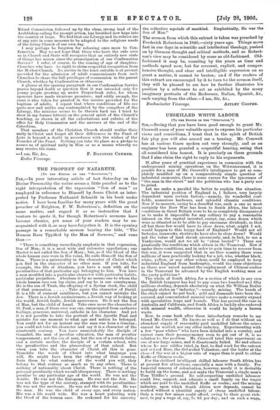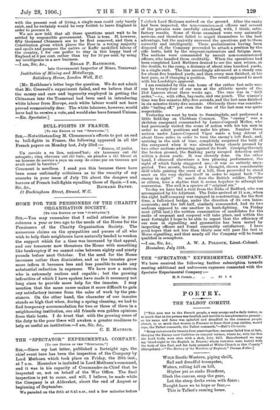UNSKILLED WHITE LABOUR
(TO THE EDITOR OF TUB "SPECTATOlt..1
SIR,—Seeing that you have been good enough to grant Mr. Creswell some of your valuable space to express his particular views and convictions, I trust that in the spirit of British fair play you will also accord me a hearing. Mr. Creswell has at various times spoken out very strongly, and as an engineer has been granted a respectful hearing, seeing that all considered him honest. It is precisely on these grounds that I also claim the right to reply to his arguments.
If, after years of practical experience in connexion with the underground mining operations on the Witwatersrand, it is possible for a man of Mr. Creswell's intelligence to get so com- pletely muddled up on a comparatively simple question of industrial economics, there is some excuse for the ignorance of "the man in the street" and the politician who has a party axe to grind.
Let me make a parallel the better to explain the situation. The industrial position of England is, I believe, very largely dependent upon certain factors,—namely, its wonderful coal- fields, numerous harbours, and splendid climatic conditions. Now if to-morrow, owing to a dreadful war, such a one as most certainly the Boer War has been to South Africa, the labour conditions in Great Britain were to be so completely disorganised as to make it impossible for any colliery to pay a reasonable interest on the capital invested, except, say, some dozen which were so situated as to be able to pay enormous dividends, so that all but these few would have to close down, what, might I ask, would happen to this happy land of England ? Would not all factories, ironworks, steelworks have also to close down? Would not the value of land shrink enormously, and, in fact, to use a Yankeeism, would not we all be "clean busted" ? These are praetically the conditions which obtain in the Transvaal. Now if under these conditions, and in order to gain time to recover from this war, it were suggested that in ancther country there were millions of men practically looking for a job, who, whether black, white, yellow, or any other colour, could be employed to keep industrial England from bankruptcy, would the same objections as those now raised against the employment of Chinese coolies in the Transvaal be advanced by the English working man or the party politician ?
The whole of South Africa, for a section of which in any case the British taxpayer has had to pay some two hundred and fifty millions sterling, depends absolutely on what Sir William Butler jeeringly styles an "industry,"—namely, mining. The hands of the clock cannot be put back ; gold and diamonds have been dis- covered, and concentrated mineral values make a country expand with speculative leaps and bounds. This has proved the case in Australia and California, and South Africa is luckily also endowed with mineral wealth, otherwise it would be largely a barren waste.
Now, to come back after these introductory remarks to my friend Mr. Creswell. He knows as well as I do that without an abundant supply of reasonably paid unskilled labour the mines cannot be worked, nor any other industry. Experimenting with a few "poor whites" who have been deluded into a country, and cannot earn their passage-money even to get out of it, is no solution to the problem. Mr. Creswell tried this experiment on one of our large mines, and it disastrously failed. He and others whom 113 now vilifies tried, in fact, to find work for the outcast and rriaed Boer, the disl aaded Volunteer, and the loafer at the close c.t the war at a higher rate of wages than is paid to either Kaffir or Chinese coolie.
For the civilised intelligent skilled labourer South Africa has at present few attractions, especially a man with a family. For Imperial reasons of colonisation, however, surely it is desirable to build up the home, and not make the Transvaal a single man's Tom Tiddler's ground. No self-respecting unskilled labourer could live, support, and educate a small family on the wages which are paid to tho unskilled Kaffir or coolie ; and the mining industry, upon which South Africa now depends, cannot be worked without a plentiful supply of cheap unskilled labour. Only a very few mines could afford, owing to their meat rich- ness, to pay a wage of, say, 7s. 13d. per day ; and on such a wage,
with the present cost of living, a single man could only barely exist, and he certainly would be very foolish to leave England in order to procure it.
We are now told that all these questions must wait to be settled by responsible government. That is true. If, however, fifty thousand Chinamen are to be first removed, and then a Constitution given which places the Boer in a voting majority and spoils and pampers the native or Kaffir unskilled labour of the country, I for one prefer to stay in this happy land of England at 3 per cent, rather than try for 10 per cent, by using my intelligence in a new business.
Institution of Mining and Metallurgy, Salisbury House, London Wall, B.C.
[Mr. Rathbone's letter begs the question. We do not admit that Mr. Creswell's experiment failed, and we believe that if the money and care and ingenuity employed in getting the Chinaman into the Transvaal had been used in introducing white labour from Europe, such white labour would not have proved economically dear. The white labourer, however, would have had to receive a vote, and would also have formed Unions. —ED. Spectator.]







































 Previous page
Previous page